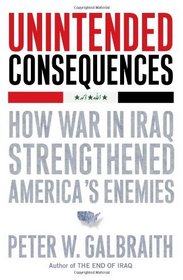Matthew S. reviewed Unintended Consequences: How War in Iraq Strengthened America's Enemies on + 3 more book reviews
What this book does really well is to outline the consequences for the U.S. and the Middle East for the failed policies of the W. Bush presidency. This book details these consequences in a very succinct and cogent fashion that is easily accessible and understandable for any reader. The author's case is very compelling. Anyone interested in learning how the U.S. went so far off course and understanding the situation we now face after eight years of the Bush administration will do well by giving this book a read.
With that said I have some problems with the work as well. The book has the feel of being a rushed effort designed to help educate the public leading up to the last presidential election. I feel like the book wasn't really written for those already well informed on the Middle East to begin with, but was instead written for independents that may not have followed recent events as closely as some others. The author created a very concise work that should be accessible to just those very readers, but for those others who may be looking for more depth from such an expert source as this author, well they maybe somewhat disappointed. While I still found the book quite valuable, some of the information was quite obvious for anyone following events for the past several years. This means that this work's value is going to be diminished for a lot of readers.
The rushed feel of the book also extended into the style and apparent lack of editing. I came across many errors throughout the book that was nothing but a lack of close editing. I don't judge the book too harshly for these but they do have the affect of making the reading somewhat cluncky in spots as the flow is disturbed. The errors were not so common that I would condem the entire work, but there are too many to ignore either.
The book has worth for any reader. If you may not be as up to date on your Middle Eastern affairs but would like a quick, easy starter then this is the perfect book for you. If you are a professional or an amatuer you will find some valuable information in this book, but you will just have to work through some sections that are pretty obvious to get that value. The book is short enough though that it isn't a chore by any means to read, so you might find it a worthy contribution to your general collection. With all that said the book isn't great, but it is good.
With that said I have some problems with the work as well. The book has the feel of being a rushed effort designed to help educate the public leading up to the last presidential election. I feel like the book wasn't really written for those already well informed on the Middle East to begin with, but was instead written for independents that may not have followed recent events as closely as some others. The author created a very concise work that should be accessible to just those very readers, but for those others who may be looking for more depth from such an expert source as this author, well they maybe somewhat disappointed. While I still found the book quite valuable, some of the information was quite obvious for anyone following events for the past several years. This means that this work's value is going to be diminished for a lot of readers.
The rushed feel of the book also extended into the style and apparent lack of editing. I came across many errors throughout the book that was nothing but a lack of close editing. I don't judge the book too harshly for these but they do have the affect of making the reading somewhat cluncky in spots as the flow is disturbed. The errors were not so common that I would condem the entire work, but there are too many to ignore either.
The book has worth for any reader. If you may not be as up to date on your Middle Eastern affairs but would like a quick, easy starter then this is the perfect book for you. If you are a professional or an amatuer you will find some valuable information in this book, but you will just have to work through some sections that are pretty obvious to get that value. The book is short enough though that it isn't a chore by any means to read, so you might find it a worthy contribution to your general collection. With all that said the book isn't great, but it is good.




![header=[] body=[Get a free book credit right now by joining the club and listing 5 books you have and are willing to share with other members!] Help icon](/images/question.gif?v=90afaeb39)
